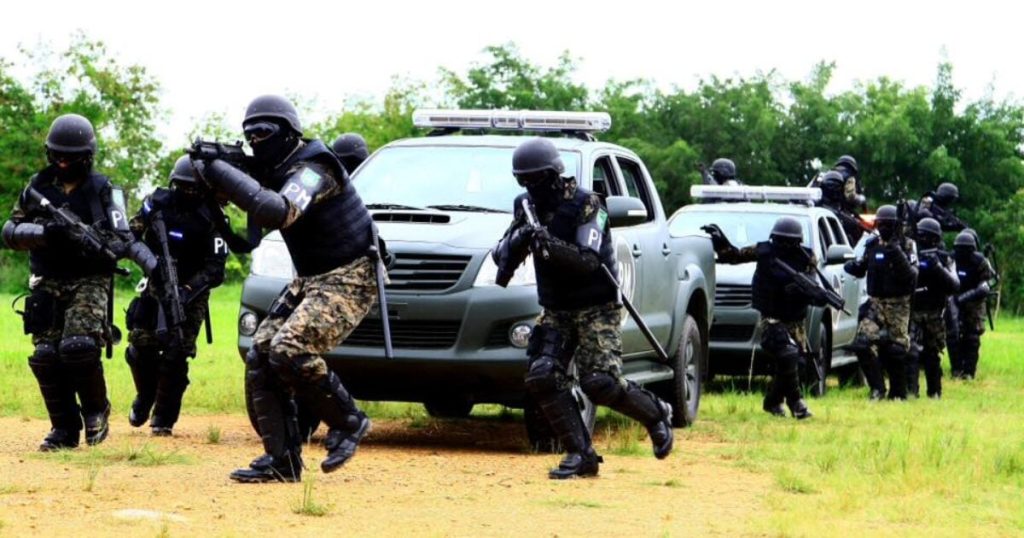“La Policía Militar del Orden Público (PMOP),” 2018, courtesy of Honduras Tierra Libre.
Honduras plans to construct a mega prison similar to El Salvador’s “Terrorism Confinement Center” (CECOT) to tackle severe crime and gang issues. This facility, located on an island, will be the only island prison colony in the Western Hemisphere.
Honduras is one of the most violent countries in the world, largely due to gang activity. Both MS-13 and the 18th Street gangs are active, with estimates suggesting up to 40,000 gang members in the country. These gangs engage in extortion, street-level drug dealing, robbery, and murder-for-hire. In 2022, Honduras reported a homicide rate of 34 per 100,000 inhabitants, significantly higher than the global average. Pervasive corruption within law enforcement and the judiciary exacerbates the issue, making it difficult to prosecute criminals and maintain public safety. This environment of fear and violence leads to severe social and economic impacts, causing widespread displacement as many citizens flee gang-related threats. This is one of the drivers of illegal immigration to the United States.
The Latin American war on crime began with El Salvador’s President Nayib Bukele, who constructed the Terrorism Confinement Center (CECOT), which opened in 2023. This massive facility, designed to hold up to 40,000 inmates and be completely inescapable, is operated by the guards, not the inmates. Under the tightest security and surveillance, including drones and cell phone jammers, and located in a remote area, the prison is heavily guarded. It serves as a cornerstone of President Bukele’s aggressive anti-gang policies.
Individuals bearing gang tattoos were arrested en masse, accounting for about 2% of the population. The most violent criminals, including murderers and rapists, received sentences as long as 700 years. CECOT serves as a cornerstone of President Bukele’s aggressive anti-gang policies, which have led to a significant crackdown on criminal activities and mass arrests of suspected gang members.
This approach has been controversial, drawing criticism for potential human rights abuses but also praise for significantly reducing crime rates. As a result, the country’s murder rate dropped from one of the worst in the world to one of the lowest. Showing their appreciation for the country’s newfound safety, the populace reelected President Bukele in a landslide for a second term.
Following El Salvador’s example, other countries in the region, such as Honduras and Ecuador, have adopted similar tough measures to combat crime and gang violence.
Both El Salvador and Honduras have designated gang members as terrorists. Honduran President Xiomara Castro has been pushing tougher measures against crime since taking office. Less than a year into her term, she realized that the existing legal framework was insufficient to combat gangs effectively. Consequently, like El Salvador’s President Bukele, Castro declared a state of exception in several parts of the country, including the capital. This declaration temporarily suspended certain constitutional rights and liberties, such as freedom of movement, assembly, and association, and allowed for increased police and military presence and powers.
The state of exception aims to provide security forces with greater flexibility to combat gangs and criminal organizations, permitting more aggressive tactics in arresting and detaining suspected gang members and other criminals without the usual legal constraints. Following El Salvador’s example, Honduras proposed building a mega prison to alleviate overcrowding in its notorious prison system, known for poor conditions and frequent violence. By centralizing high-risk inmates in a heavily secured facility, the Honduran government hopes to isolate gang leaders and disrupt their operations, potentially reducing violence and criminal activities both inside and outside the prisons. Honduras might seek international funding and support for this project, similar to El Salvador’s approach, which has received backing from countries interested in regional stability.
The third country which is waging war on crime is Ecuador. The country has nearly collapsed due to a surge in crime caused by narcotraffickers from Colombia and other countries using Ecuador as a shipping port to reach US markets by sea. Its strategic location between major drug-producing countries Colombia and Peru has made Ecuador a significant transit point for cocaine smuggling, attracting powerful drug cartels and increasing gang activity within the country.
Ecuadorian President Daniel Noboa was elected due to his strong anti-crime stance. Since taking office in November 2023, he has declared an “internal armed conflict” against drug gangs and implemented a state of exception, similar to the measures taken by El Salvador’s President Nayib Bukele. Noboa’s security plan includes expanding military and police authority, constructing new high-security prisons, and deporting foreign prisoners to reduce prison overcrowding. His tough approach on crime has resonated with voters, who want to live in safety.
The citizens of El Salvador, Honduras, and Ecuador have been pushed to the breaking point by rampant crime and have voted in governments willing to crack down aggressively on criminal activities. All three countries recognized that arresting criminals, locking them away, and using lethal force when necessary can be an effective strategy for dealing with crime. A significant percent of crimes are committed by repeat offenders, so incarcerating violent criminals in El Salvador’s mega prison or Honduras’ planned prison island is expected to cause crime rates to plummet.
The post Suspending the Constitution and Building Mega Prisons: Three Latin American Countries’ War on Crime appeared first on The Gateway Pundit.







